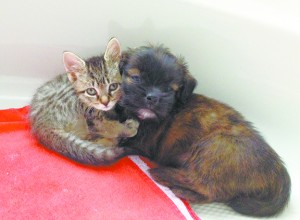The road to adoption: PRC SPCA’s foster care program enriches lives
Published 12:34 pm Friday, August 8, 2014
Fostering an animal is just one of many ways to help improve the lives of homeless pets.
Although rescue facilities would like to house every homeless pet, it’s often impractical or even impossible due to a lack of space or resources. Thus animals, otherwise euthanized, can be saved through caring people who are willing to open their home and hearts to a shelter pet in need.
Melissa Peterson, mother of three, recently began looking for ways give back to the community in order to teach her young children about the importance of helping others.
In her search, she discovered foster care for pets through the Pearl River County SPCA.
After having fostered several pets through the program, Peterson recalls stumbling across an SOS message on the shelter’s Facebook page.
The message requested help bottle-feeding two orphan puppies whose eyes were still shut — sibling Shih Tzu’s, Phineas, and his unnamed sister, who was in poor health and required intensive care.
The local facility is not set up to bottle-feed, and because of the crowded nature of the shelter, foster parents are desired to care for animals whose immune systems may be lowered or those who just need a little extra love and attention.
Peterson volunteered to take in the two young pups, but the female was soon lost after her health continued to decline.
Almost immediately, Fiona, a young foster kitten less than a week younger than Phineas came into the home. Fiona was a stray who needed care for a paw injury.
The kitten instantly snuggled up next to Phineas and since his eyes were still closed, Fiona took the place of his lost sister, without him ever knowing.
Peterson says, “Their story really shows family is what you make it.”
SPCA President Maria Diamond says pets 4-weeks and younger can easily develop upper-respiratory problems in a shelter. Animals with low immune systems can become susceptible to many illnesses like colds and viruses, especially in a crowded environment.
The most common types of foster care required are for animals who are being treated for injuries or illness, orphaned kittens and puppies who are too young to be spayed or neutered, and cats and dogs who are nursing a litter.
Young pets are sent to foster homes until they reach 8-weeks-old. Then they are immediately spayed or neutered and put up for adoption.
Foster parents provide temporary care for pets in their own homes, at no cost. The shelter provides food, medical care, shots, worming, pet supplies, and plenty of support.
When Peterson speaks of her experience with the foster program, she says, “It’s so rewarding to see foster animals interacting with their new families. It allows us to see we were a part of something bigger.”
Phineas and Fiona are now 10-weeks-old. They were both adopted into their forever homes.
The lesson Peterson hopes to teach her kids through the experience is that “not everything you love will you get to keep. It’s good to have something and help heal it, then help it move on.”
By offering time, energy and a loving environment to an animal in need, foster homes prepare the animal for adoption into a permanent home.
Want to know more about volunteering to foster an animal? Call 601-798-8000. The SPCA is open Tuesday through Saturday from 10 a.m. to 4 p.m.
By Debra Howell
Picayune Item




